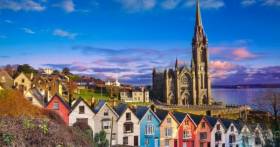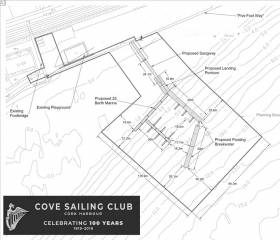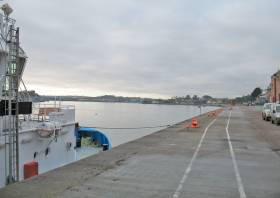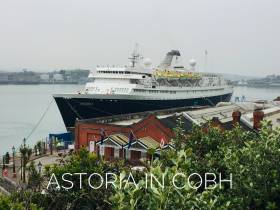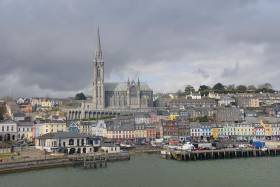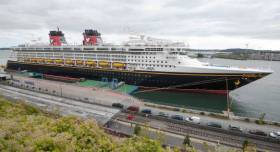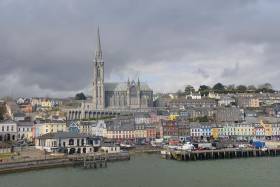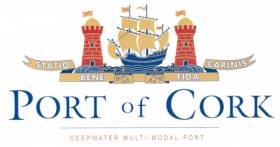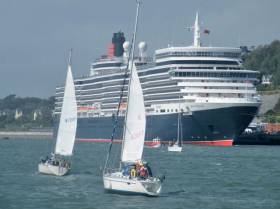Displaying items by tag: Cobh
In Cork Harbour the town of Cobh is bracing itself for the arrival of some 1,500 Australians ahead of the town's annual 'Australia Day' celebrations.
The cruiseship Sea Princess, EchoLive.ie writes, will be making a pitstop in Cork Harbour on July 11 as part of its 107-day round-the-world cruise.
Cobh, which was recently named one of the 25 most beautiful towns in Europe by Conde Nast, will be just one of the 36 ports it visits on the 59,000km journey. The event will be marked with festivities and christened ‘Australia Day in Cobh.’ It will include festivities to mark the special occasion including Irish dancing, market stalls and a performance from trad band Gaelic Brew on the bandstand.
Passengers will later be treated to a musical farewell from Cobh Confraternity Band.
For more including the role of the Australian Ambassador to Ireland click here.
Cove Sailing Club has announced that Cork County Council gave approval on Monday (13 May) to its plans for a new 25-berth marina located at Whitepoint.
Earlier this year saw the display of new plans for the marina, scaled down from a larger scheme that faltered in the planning stages some years ago.
It was reported in the East Cork Journal in March that the new marina plan — touted as a major boost to marine tourism in the Cork Harbour town — would be divided between visitor moorings and club spaces, with a 40m pontoon for ferry sailings to Spike Island.
The club hailed its now green-lit joint venture with the council as “fantastic news for the people of Cobh and the Cork Harbour area” and announced it would be holding meetings in the coming weeks for those interested in a berth or to discuss the project in greater detail.
Cove Sailing Club is also celebrating its centenary this year, and will launch a special yearbook to mark the occasion this Friday evening 17 May from 8pm at the Sirius Arts Centre in Cobh.
Port Of Cork Moves To Clarify Cobh Quay Closures After Gardai Called To ‘Right Of Way’ Protest
The Port of Cork has issued a “clarification” over its closures of the deepwater quay in Cobh after gardai were called to a recent protest at the facility.
The Irish Examiner reports that there was what gardai described as a “minor altercation” at the quay on the evening of Friday 3 May involving port security and ‘right of way’ protesters.
It’s claimed that one protester was injured while attempting to help a fellow demonstrator after an altercation.
The incident happened during the disembarking of the Celebrity Reflection cruise liner at the quay.
Demonstrators object to the port’s closure during cruise berthings of the quayside and its adjoining walkway, which they maintain has been a traditional right of way for more than 150 years.
But the Port of Cork Company has dismissed those assertions in a statement, saying that “despite erroneous claims to the contrary, Port of Cork Company is the freehold owner of Deepwater Quay” and that “no public right of way exists” over the quay.
“While the Port of Cork Company (and previously Cork Harbour Commissioners) have been willing to permit access by the public to Deepwater Quay, the port has always controlled such access where required in the interest son heath and safety, security and the smooth and safe management of shipping traffic.”
Port chief executive Brendan Keating acknowledged “challenges” facing the port as its cruise business has grown in recent years.
Among these are “high-risk” berthing operations involving multiple mooring lines.
“Like every port around the globe, the Port of Cork does not take risks, especially when it comes to the safety of employees, the public or visitors and for this very reason, the Port of Cork closes off the quay during arrival operations.
“The quay is normally closed for a period of approx 30 minutes and during this period the arriving shore excursion coaches are marshalled into into place while the quay is free of pedestrians, this reducing any risk of a traffic accident.”
The port company added that “it is by no means the intention of the port to obstruct members of the public from accessing the deepwater quay or to diminish the enjoyment gained by the public from observing such magnificent liners up close”.
Protestors at Cobh Cruise Ships Urged to Stop
#corkharbour - A picket by protestors held at Port of Cork sites in Cobh due to a dispute over public rights of way have been asked to stop, due to concerns that it is giving a bad impression to cruise liner tourists.
Locals reports EchoLive.ie are aggrieved that access to the Five Foot Way on Deepwater Quay has been restricted when cruise liners are docked.
However, the Port of Cork has said it needs to close the area for health and safety reasons when incoming cruise liners are tying up and taking off.
The 580 passengers arriving on the first cruise liner of the season on Monday, the Astoria, were met with protesters and more demonstrations are planned if an agreement is not reached.
The protestors have moved to clarify they are not picketing against the liners but some local councillors urged them to pursue the matter through other avenues.
More on the story can be read through this link.
New Cobh Marina Plans Set For Public Display
Cobh may finally get a new marina in what’s being touted as a major boost to marine tourism in the Cork Harbour town, as plans are prepared for public display.
The East Cork Journal has details on the new €450,000 development — scaled down from a larger plan that faltered a number of years ago — which would see 25 berths divided between visitor moorings and club spaces, and a 40-metre pontoon that would serve as a ferry port for access to Spike Island.
Future expansion is also envisaged for the new scheme, a joint venture between Cork County Council and Cove Sailing Club — which last month celebrated its 100th anniversary.
The Cork Harbour institution has since been joined in the area by the new Great Island Sailing Club, established after Cove’s previous marina plans failed to progress and prompted concerns over its pressures on sailing activities.
#corkharbour - The Irish Examiner writes that a battle over rights of way in a Cork Harbour town could lead to pickets being placed at its deep water quay when cruise liners start to arrive for the new season in April.
A warning was given by a county councillor that this could happen because as Afloat previously reported people in Cobh are so upset with alleged rights of way being extinguished by the Port of Cork.
Independent councillor Diarmaid Ó Cadhla told a meeting of the Cobh/Glanmire Municipal District Council that he wasn’t satisfied with claims made by the port authority that it owns a section of the deep water quay and all of the former IFI plant at Marino Point and could therefore stop people walking in both areas.
Last weekend some protesters tore down ‘Do not enter’ signs at a walkway at Marino Point which, said another councillor, had been a right of way since the 1980s. The Port of Cork is planning to redevelop the plant as a bulk-handling cargo terminal.
Click here for more on the story.
Cork Harbour Concerns Over Port’s Closure of Cobh Path
#corkharbour - The Echo Live reports of a dispute in Cork Harbour between locals and the Port of Cork over the right of way on a long-established walkway in Cobh, could have national consequences, according to a local councillor.
Locals are outraged that the Port of Cork has been closing an area known locally as Five Foot Way on Deepwater Quay — from the Annie Moore statue to the train station at Whitepoint — when cruise vessels are docked.
Last September, the walkway was closed to public use for a period of over four hours when the Disney Magic cruise vessel was docked at the site.
Private security personnel also prevented cars from parking in the area and restricted access, according to locals.
Locals say the Port of Cork does not have a right to do this as it does not own the land.
Councillor Diarmaid Ó Cadhla said little-known legislation under the Land and Conveyancing Law Reform Act 2009 requires all rights of way to be registered before 2021.
The newspaper has more on the dispute, be clicking here.
Permission Sought For New Floating Jetty At Cobh
#CorkHarbour - Planning permission is being sought for a floating jetty at Kennedy Pier in Cobh.
SailCork.com shared details on its Facebook page of the planning notice for the development, being undertaken by Cork County Council and the Port of Cork.
It’s expected that the proposal would allow for passenger ferries to bring visitors right to the heart of the Cork Harbour port town.
Plans are currently available for inspection at the Cork County Council office in Cobh until Friday 3 August, with written submissions open till Friday 17 August.
Port Of Cork Secures Marino Point Site In Landmark Deal
#PortOfCork - The Port of Cork has secured the former Irish Fertiliser Industries Plant at Cobh in a public-private partnership deal that will see a significant expansion of its cargo handling facilities.
According to the Irish Examiner, the circa €6 million deal with Wexford-based Lanber Holdings gives the port a 40% stake in the site of the Marino Point plant, which closed in 2002 with the loss of 220 jobs.
Port of Cork chief executive Brendan Keating said the partnership will “explore every business opportunity for the site”.
He added: “We will focus initially on cargo handling and new trading opportunities, such as fertiliser and animal feed importation.”
The news follows the announcement of a new project to ship more than €300 million worth of natural gas from Texas to Cork, as reported yesterday on Afloat.ie.
It also comes as stakeholders in Cork Harbour propose moving the long-mooted International Shipping Services Centre to Leeside, and alongside plans for an improved cruise liner terminal on Cobh.
Plans For New Cobh Cruise Liner Terminal By 2020
#CruiseLiners - A new cruise liner terminal for Cobh could be up and running by 2020, as the Irish Examiner reports.
Port of Cork commercial manager Captain Michael McCarthy says Ireland’s only dedicated cruise ship berth needs to take advantage of the expanding, and increasingly crowded, cruise season.
Upgrades to the existing berth at Cobh in Cork Harbour, begun two years ago at a cost of €1.5 million, involved the addition of high-load mooring bollards to allow for the docking of larger ships.
But Capt McCarthy says an additional berth is required to take Cork’s cruise liner business further and accommodate the next generation of liners.
The proposal includes a new ‘sea bus’ terminal providing a cross-harbour ferry link to bring visitors to Cork city and the harbour’s various attractions, including the redeveloped Spike Island. The Irish Examiner has more on the story HERE.
Earlier this month, Afloat.ie covered that the Port of Cork had lost its status as the most popular destination for overseas tourists visiting Ireland on cruise liners.



























